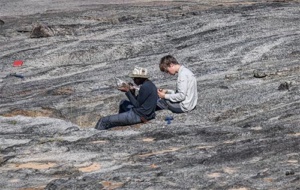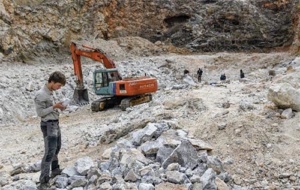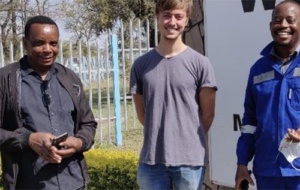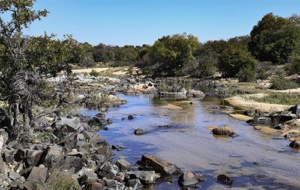Zimbabwe Fieldwork 2022

Brian and I studying a granite outcrop in the Limpopo region
Old Members’ Trust Graduate Conference and Academic Travel Fund Report – Lot Koopmans (2021, Environmental Research (NERC DTP) – Earth Sciences)
Between 22 June and 25 July, I conducted an exciting fieldwork season partly funded by Univ and the Old Member’s Trust as part of my DPhil project in Zimbabwe. Zimbabwe has a unique geological history which spans over 3.8 billion years of Earth history, and preserves key points of Earth’s evolution; the rise of Earth’s earliest continents, fossils of some of the earliest oxygen producing bacteria (which produced the first whiffs of the air we breathe today), periods of time when the whole Earth was covered in glaciers (Snowball Earth events), and several relics of ancient mountain belts.

A visit to the Mistress mine near Harare to see a very interesting Lithium deposit.
My focus in Zimbabwe, and the topic of my DPhil project, is to try and understand how the Earth’s earliest continents formed. Within these early slivers of Earth’s crust are deposits of critical metals such as Lithium, Caesium, and Tantalum, all of which are essential to the renewable technologies. To understand how these continents formed may therefore help us understand why these deposits are here and point to where we may find more of them.
Upon arrival in the country, I met Brian – a master’s student from Zimbabwe who was there to collaborate with me in the field. Together we spent the first three weeks travelling through the country visiting some key sites to build the geological story. At sites deemed to be interesting, we collected a set of samples which I will analyze back in Oxford.
We also visited a set of active mine sites, talking with exploration geologists to try and better understand how the critical metal deposits fit into the geological history of Zimbabwe. For this, we were helped by Dr Martin, a retired professor and geological consultant who has worked in Zimbabwe for over 50 Years.

Midlands State University – Dean of Science (right) and one of the lab technicians (left).
After these four weeks, I spent a few days in Zvishavane, visiting Midlands State University and meeting their lecturers in geology. I was given a tour of their lab facilities and met their lab technicians. We discussed avenues of collaboration and how we could help each other in the future.
The final week was spent at a greenfield exploration site near Bulawayo, in the mid-west of Zimbabwe. There, I helped the exploration geologists understand the area, and taught them digital field techniques. This involved long days of walking around the bush, trying to understand the structure of the region, and producing a geological map.

The Tokwe river, which hosts the oldest rocks in Zimbabwe.
In summary, the field season was a great success, and provided me with many opportunities to learn from new experiences and prepare myself for the coming years of my DPhil. I am now waiting for my samples to arrive in Oxford, after which I will be able to conduct my lab work which will help shed light on the questions I have set out to answer. I am very thankful to Univ and the Old Member’s Trust for their support in funding part of my fieldwork, without it I wouldn’t have been able to do everything we set out to do.
Find out more about the range of travel grants and scholarships available to assist Univ students on our Travel Grants page or read further travel reports.
Published: 24 October 2022
